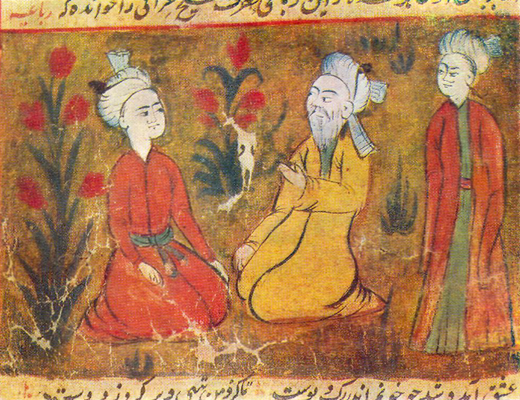Ashiqa of Amir Khusru, translated in Elliot and Dowson, History of India as told by its own Historians, Volume III, pp. 545-46.
Contesto: “Happy Hindustan, the splendour of Religion. where the Law finds perfect honour and security. In learning Dehli can now compete with Bokhara, for IslAm has been made manifest by its kings. The whole country, by means of the sword of our holy warriors, has become like a forest denuded of its thorns by fire. The land has been saturated with the water of the sword, and the vapours of infidelity have been dispersed. The strong men of Hind have been trodden under foot, and all are ready to pay tribute. Islam is triumphant, idolatry is subdued. Had not the law [of Imam Hanifa] granted exemption from death by the payment of poll-tax, the very name of hind, root and branch, would have been extinguished. From Ghazni to the shore of the ocean you see all under the domination of Islam. Cawing crows see no arrows pointed at them; nor is the TarsA (Christian) there, who does not fear (taras) to render the servant equal with Allah; nor the Jew who dares to exalt the Pentateuch to a level with the Kuran; nor the Magh who is delighted with the worship of fire, but of whom the fire complains with its hundred tongues. The four sects of Musulmans are at amity and the very fish are Sunnis.”
Amir Khusrow: Frasi in inglese
“The Hindu happens to be a (wretched) slave in all respects.”
quoted in Lal, K. S. (1999). Theory and practice of Muslim state in India. New Delhi: Aditya Prakashan. Chapter 4
Nuh Siphir
About Sultan ‘Alau’d-Din Khalji (AD 1296-1316) and his generals conquests in Somnath (Gujarat) Mohammed Habib's translation quoted by Jagdish Narayan Sarkar, The Art of War in Medieval India, New Delhi, 1964, pp. 286-87.
Khazainu’l-Futuh
Extract trs. in Elliot and Dowson, III, p. 563. quoted from Lal, K. S. (1992). The legacy of Muslim rule in India. New Delhi: Aditya Prakashan. Chapter 5
Nuh Siphir
About Sultan ‘Alau’d-Din Khalji (AD 1296-1316) in Vidisha (Madhya Pradesh) Elliot and Dowson, History of India as told by its own historians, Vol. III, p. 542.ff
Miftahu'l-Futuh
Amir Khusrau, Khazain-ul-Futuh, trs., in E.D. vol. III, p. 77. quoted from Lal, K. S. (1999). Theory and practice of Muslim state in India. New Delhi: Aditya Prakashan. Chapter 3
Khazainu’l-Futuh
“The Turks, whenever they please, can seize, buy or sell any Hindu.”
Trs, in Elliot and Dowson, III. quoted from Lal, K. S. (1994). Muslim slave system in medieval India. New Delhi: Aditya Prakashan. Chapter 5
Nuh Siphir
About Sultan ‘Alau’d-Din Khalji (AD 1296-1316) and his generals conquests in Jhain (Rajasthan)S.A.A. Rizvi, Khalji Kalina Bharata, Aligarh, 1955, pp. 160
Khazainu’l-Futuh
About Sultan Jalalu’d -Din Khalji (AD 1290-1296) in Jhain (Rajasthan) Elliot and Dowson, History of India as told by its own historians, Vol. III, p. 542.
Miftahu'l-Futuh
Ma’bar: (Parts of South India), About Sultan ‘Alau’d-Din Khalji (AD 1296-1316) and his generals conquests in Deccan and South India Elliot and Dowson, History of India as told by its own Historians,Vol. III, p. 81-85
Khazainu’l-Futuh
Amir Khusrow, quoted from Harsh Narain, Myths of Composite Culture and Equality of Religions (1990) p. 17 https://archive.org/details/MythOfCompositeCultureHarshNarain
About Sultan Jalalu’d -Din Khalji (AD 1290-1296) in Jhain (Rajasthan) Translated from the Hindi version by S.A.A. Rizvi included in Khalji Kalina Bharata, Aligarh, 1955, pp. 153-54.
Miftahu'l-Futuh
About Sultan Jalalu’d -Din Khalji (AD 1290-1296) in Devagiri (Maharashtra) Elliot and Dowson, History of India as told by its own historians, Vol. III, p. 542.ff
Miftahu'l-Futuh
About Sultan ‘Alau’d-Din Khalji (AD 1296-1316) and his generals conquests in Warangal (Andhra Pradesh) Elliot and Dowson, History of India as told by its own Historians,Vol. III, p. 81-85
Khazainu’l-Futuh
About Sultan ‘Alau’d-Din Khalji (AD 1296-1316) in Delhi. S.A.A. Rizvi, Khalji Kalina Bharata, Aligarh, 1955, pp. 156-57.
Khazainu’l-Futuh
Miftah-ul-Futuh (Aligarh text, 1954), p. 22. quoted from Lal, K. S. (1992). The legacy of Muslim rule in India. New Delhi: Aditya Prakashan. Chapter 4
Miftahu'l-Futuh
About Sultan ‘Alau’d-Din Khalji (AD 1296-1316) and his generals conquests in Somnath (Gujarat) S.A.A. Rizvi, Khalji Kalina Bharata, Aligarh, 1955, pp. 159
Khazainu’l-Futuh
About Sultan ‘Alau’d-Din Khalji (AD 1296-1316) and his generals conquests in Warangal (Andhra Pradesh) Elliot and Dowson, History of India as told by its own Historians,Vol. III, p. 81-85
Khazainu’l-Futuh
About Sultan Mubarak Shah Khalji (AD 1316-1320) in Warrangal (Andhra Pradesh) Elliot and Dowson, History of India as told by its own Historians,Vol. III, p. 559
Nuh Siphir
Amir Khusrau, Nuh Sipehr, Elliot and Dowson, III, p.563. quoted from Lal, K. S. (1992). The legacy of Muslim rule in India. New Delhi: Aditya Prakashan. Chapter 1
Nuh Siphir
Pattan (Tamil Nadu) in the reign of Sultan ‘Alau’d-Din Khalji (AD 1296-1316) Elliot and Dowson, History of India as told by its own Historians,Vol. III, p. 550-551
Dawal Rani-Khizr Khani
About Sultan ‘Alau’d-Din Khalji (AD 1296-1316) and his generals conquests in Madura (Tamil Nadu) Elliot and Dowson, History of India as told by its own Historians,Vol. III, p. 90-91
Khazainu’l-Futuh
“Everyone threw himself, with his wife and children, upon the flames and departed to hell.”
Khazainu’l-Futuh
Origine: quoted in (Oxford in India readings, Themes in Indian history.) Richard Maxwell Eaton - India's Islamic traditions, 711-1750-Oxford University Press (2003) 38.
